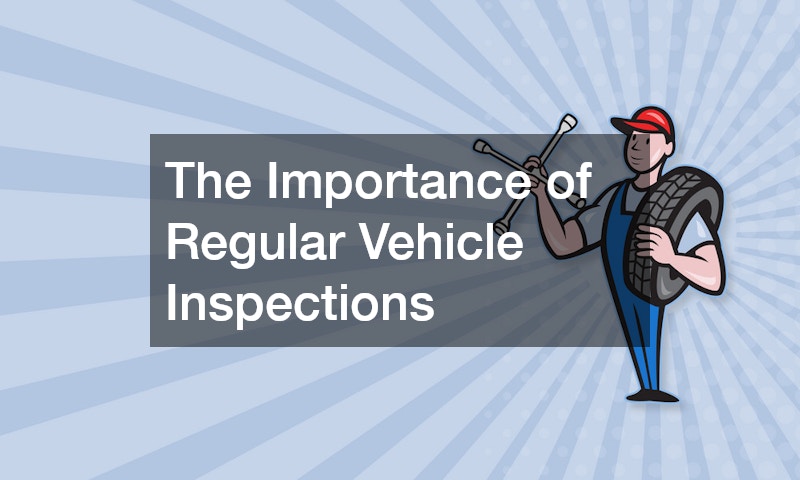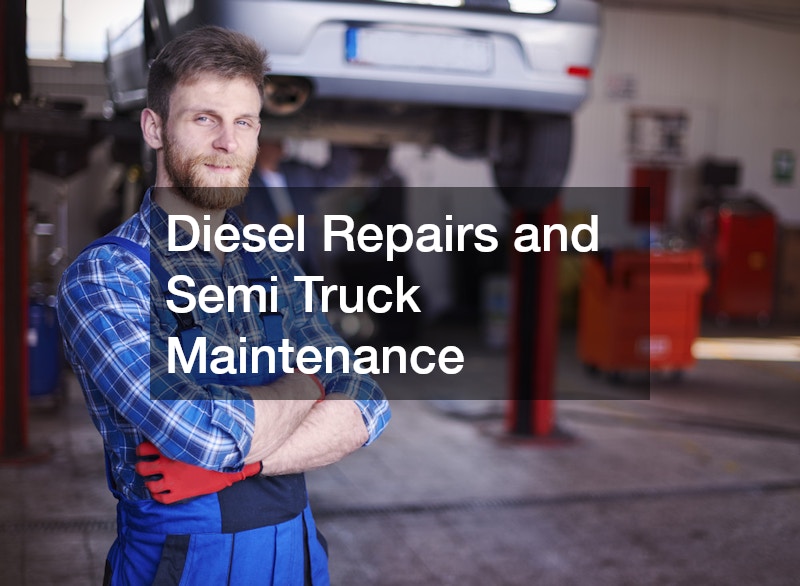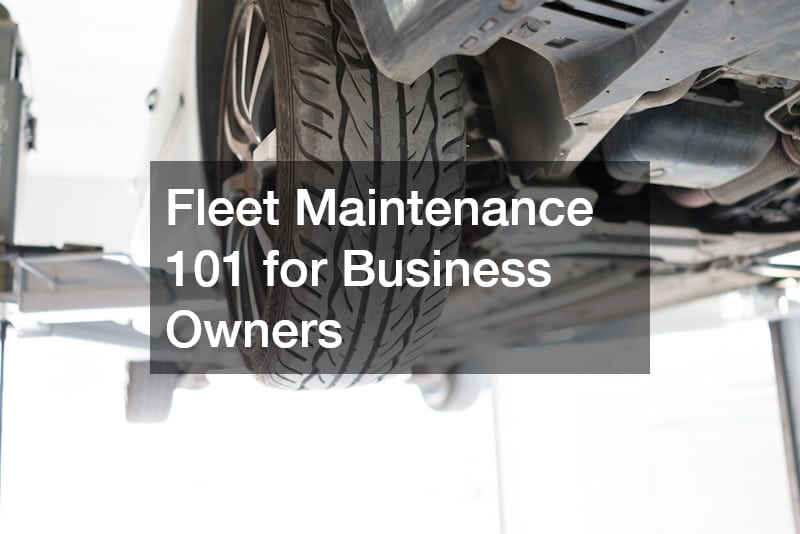Managing a fleet of vehicles is no small task, especially when the fleet is integral to the success of your business. Whether you’re in logistics, delivery, or transport services, keeping your fleet in top condition is critical to ensuring smooth operations, reducing unexpected breakdowns, and saving money on repairs in the long run. Proper fleet maintenance is an essential part of any business that relies on vehicles to function.
In this blog, we’ll cover the fundamentals of fleet maintenance, how to avoid costly repairs, and provide useful tips on keeping your fleet running efficiently. We’ll also explore the importance of regular check-ups and services, from diesel repairs to collision repairs, and how investing in proper upkeep can save your business from costly downtime.
1. The Importance of Regular Vehicle Inspections

One of the most effective ways to maintain your fleet is through regular inspections. Implementing a routine vehicle inspection schedule can help identify minor issues before they become major problems. A well-maintained fleet is safer, more reliable, and less expensive to run.
Daily or weekly inspections should include checking tire pressure, oil levels, lights, and brakes. It’s also important to assess each vehicle’s fluids, such as coolant and transmission fluid, to prevent overheating or mechanical failure. Small details like windshield wipers and mirrors can seem insignificant but are vital to the safe operation of your fleet.
For businesses that use large vehicles such as trucks or semi-trailers, incorporating regular diesel repairs into the maintenance schedule is essential. Diesel engines often run longer and harder than standard gasoline engines, so keeping them in good condition through oil changes, air filter replacements, and inspections of the fuel system will prolong their lifespan and reduce the chances of expensive breakdowns.
2. Local Auto Repair Services: The Backbone of Fleet Maintenance
Working with a reliable local auto repair shop is crucial for the upkeep of your fleet. Business owners should establish a relationship with a trusted repair service that understands the specific needs of their vehicles. Local auto repair shops can provide a range of services, from oil changes to brake inspections, ensuring your vehicles remain in top shape.
For fleets that operate both small cars and trucks, it’s essential to find a repair shop capable of handling various types of vehicles. A good local repair shop will provide routine maintenance, diagnostic services, and quick fixes for issues that arise unexpectedly. These services are vital in keeping your fleet operational and minimizing downtime.
Moreover, a reputable local auto repair shop will be well-versed in collision repairs, which is an unfortunate but common reality of managing a fleet. Whether it’s a minor fender bender or more significant damage, having a reliable partner to handle auto body repair quickly and efficiently will keep your vehicles on the road.
3. Diesel Repairs and Semi Truck Maintenance

If your business operates a fleet of diesel-powered trucks or semi trucks, regular diesel repairs are a must. Diesel engines, while durable, require specialized maintenance due to the high levels of stress they experience from heavy loads and long-haul trips. Diesel repairs typically involve inspecting the fuel system, turbocharger, and cooling system, all of which are critical for keeping your semi trucks running efficiently.
Semi truck repair services can address engine issues, axle problems, and transmission failures. Scheduling routine check-ups with a diesel specialist can prevent small issues from escalating into major problems that could take your trucks off the road for days or even weeks. Additionally, having a truck-specific repair plan ensures that repairs are done in a timely manner, keeping your business moving.
Diesel engine failure can lead to costly delays, so staying on top of engine diagnostics, oil changes, and exhaust system checks should be part of every fleet maintenance plan. Diesel mechanics understand the unique requirements of semi trucks and can ensure that your heavy-duty vehicles receive the attention they need.
4. Maintaining Vehicle Aesthetics: Auto Body and Collision Repairs
In addition to mechanical maintenance, it’s important to keep your fleet looking professional and well-maintained. Accidents happen, whether it’s a minor scratch or a more serious collision, and how you address those incidents reflects on your company’s image.
Investing in auto body repair and collision repairs ensures that your vehicles remain visually appealing and safe to drive. Even minor dents and scratches can lead to rusting or further damage if left unattended. Aesthetic damage can also negatively impact your brand’s reputation, especially if your fleet is regularly seen by clients or the public.
Auto body repair shops can restore your fleet to like-new condition by fixing dents, scratches, and paint damage. Having a fleet that looks as good as it runs not only maintains its value but also boosts your company’s image.
5. Modifying Vehicles for Functionality: Truck Lift Kits and Truck Tops
If your business operates in rough or off-road environments, installing truck lift kits and truck tops can increase the functionality of your fleet. Lift kits raise the vehicle’s suspension, providing additional ground clearance that is useful in construction, agriculture, and other industries that require off-road driving.
However, after truck lift kit installation, regular maintenance becomes even more critical. Lift kits can impact the vehicle’s alignment, suspension, and handling, so routine checks are necessary to ensure that everything continues to function as intended. Maintaining lifted trucks can require specialized services, so it’s important to work with mechanics who have experience with lifted vehicles.
Truck tops also enhance functionality by protecting cargo from the elements and securing tools and materials during transport. Whether your business carries equipment or supplies, truck tops provide a simple and effective way to protect valuable cargo from damage and theft. Maintaining truck tops involves checking for leaks, ensuring locks are secure, and keeping the structure clean and rust-free.
6. The Role of Local Car Insurance in Fleet Management

Managing a fleet of vehicles requires not only mechanical maintenance but also the proper insurance coverage. Local car insurance is essential to protect your fleet in case of accidents, theft, or damage. Business owners should work closely with their insurance providers to ensure they have comprehensive coverage that includes liability, collision, and even towing services.
Additionally, fleet insurance can be customized to suit the unique needs of your business. For example, if your fleet includes trucks, semi trucks, or specialized vehicles, you’ll need a policy that covers all relevant risks. Regularly reviewing your insurance policies ensures that you’re getting the best coverage for the best price while avoiding any gaps in protection.
Having proper local car insurance can also reduce the financial strain of accidents or breakdowns by covering repair costs, legal fees, and replacement vehicle rentals when necessary. This ensures your business can continue operating even when unexpected incidents occur.
7. Transport Services and Fleet Efficiency
For businesses that rely on transport services, fleet efficiency is paramount. Whether your company is responsible for delivering goods, shuttling passengers, or providing on-demand services, maintaining a fleet that operates smoothly and efficiently is key to meeting deadlines and keeping customers happy.
Effective fleet maintenance involves not only mechanical upkeep but also optimizing routes, reducing fuel consumption, and ensuring timely repairs. Regular maintenance checks ensure that your vehicles are in top condition, reducing the chances of a breakdown that could disrupt service.
Many transport services utilize fleet management software to track vehicle performance, fuel usage, and driver behavior. By leveraging data, business owners can make informed decisions on vehicle maintenance schedules, route planning, and even when to replace aging vehicles.
8. Propane Services: Fueling Fleet Operations
If your fleet includes propane-powered vehicles, partnering with propane services providers is essential for keeping your fleet fueled and running efficiently. Propane is often used in delivery trucks, buses, and forklifts because it is a cleaner, more environmentally friendly fuel compared to gasoline or diesel.
Propane-powered fleets require regular inspections of fuel tanks, lines, and valves to ensure they’re in good working condition. Working with reputable propane services companies guarantees that your fleet will always have access to reliable fuel supplies and that the propane systems are maintained safely.
In addition to providing fuel, propane services providers can help train your staff on proper refueling procedures and propane safety, ensuring that your fleet operations are smooth and efficient.
9. Investing in Fleet Technology and Automation
In today’s world, fleet maintenance has evolved beyond just mechanical repairs and oil changes. Technology plays a crucial role in keeping your fleet running efficiently and minimizing costs. Fleet management software, GPS tracking, and telematics systems can help business owners monitor vehicle performance in real-time, optimize routes, and reduce fuel consumption.
Telematics systems also provide data on driver behavior, such as speeding, harsh braking, and idling. By analyzing this information, business owners can implement training programs to improve driving habits, reduce accidents, and prolong the life of their vehicles.
Moreover, integrating fleet technology with automated maintenance scheduling can ensure that routine tasks like oil changes, tire rotations, and diesel repairs are done on time. Automation reduces the risk of human error and ensures that every vehicle in your fleet receives the attention it needs.
10. The Importance of Scheduling Preventative Maintenance

One of the most important strategies for maintaining your fleet is preventative maintenance. Scheduling regular maintenance—rather than waiting for something to go wrong—can save your business time and money. Preventative maintenance includes everything from oil changes and brake inspections to more specialized tasks like diesel engine diagnostics and semi truck repair.
Preventative maintenance also involves inspecting tires, suspension systems, and electrical components. By catching issues early, you can avoid breakdowns that could take vehicles out of service for days or weeks.
Additionally, preventative maintenance improves fuel efficiency, reduces emissions, and extends the life of your vehicles. For businesses that rely on transport services, a well-maintained fleet is critical for delivering goods and services on time.
11. Keeping Drivers Informed and Trained
While maintaining the vehicles themselves is critical, ensuring your drivers are trained and informed is equally important. Well-trained drivers can help extend the life of your vehicles by practicing safe driving habits and being aware of potential mechanical issues. Regular driver training programs can include everything from defensive driving techniques to basic vehicle inspections.
Drivers should be trained on how to handle emergency situations, such as breakdowns or collisions, and know the proper procedures for contacting local auto repair services or arranging for heavy-duty towing if necessary. Having well-informed drivers reduces the risk of accidents and improves the overall efficiency of your fleet.
Additionally, involving your drivers in the fleet maintenance process by encouraging them to report any issues immediately can help prevent small problems from becoming major repairs.
Prioritizing Fleet Maintenance for Long-Term Success
For business owners who rely on a fleet of vehicles, maintaining those vehicles is essential for long-term success. From routine maintenance like oil changes and tire rotations to more specialized services like diesel repairs, auto body repair, and collision repairs, ensuring your fleet is in top shape will minimize downtime and maximize efficiency.
By investing in preventative maintenance, partnering with trusted local auto repair shops, and utilizing fleet management technology, you can keep your vehicles running smoothly and reduce the risk of costly repairs. Whether you operate transport services or manage a small fleet of delivery trucks, proper maintenance ensures your business stays on the road and continues to thrive.
